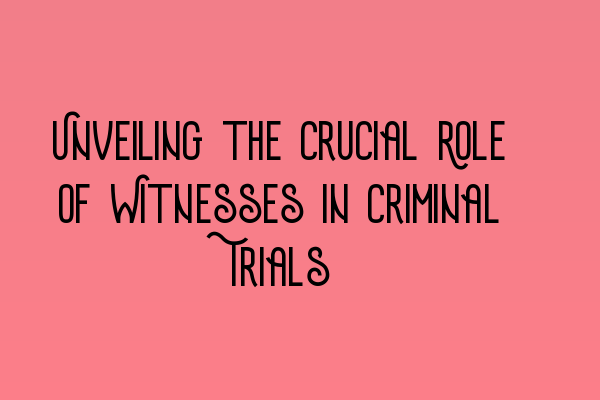Unveiling the Crucial Role of Witnesses in Criminal Trials
In a criminal trial, witnesses play a vital role in assisting the court in reaching a just verdict. They provide firsthand accounts of events, offer the court insight into the circumstances surrounding a crime, and contribute to the determination of guilt or innocence. The testimony of witnesses can make or break a case, which is why their role is considered to be of utmost importance.
Understanding the Importance of Witness Testimony
Witness testimony serves as crucial evidence in a criminal trial. It helps establish the facts of the case and provides corroborative evidence to support or challenge the prosecution’s case. The credibility and reliability of witnesses are often scrutinized and evaluated by the court, as they are relied upon to provide an accurate and unbiased account of the events they witnessed.
Witnesses may be crucial in identifying the perpetrator of a crime. Their identification of the accused can significantly impact the outcome of a trial. The court pays close attention to the details provided by witnesses, such as physical appearance, distinctive features, and any other relevant information that may assist in establishing the identity of the accused.
It is also important to note that witnesses are not just limited to eyewitnesses. Forensic experts, medical professionals, and other individuals with specialized knowledge and expertise may also be called as witnesses to present scientific or technical evidence that supports or challenges the prosecution’s case.
The Role of Witnesses in Criminal Proceedings
Witnesses play a vital role in criminal proceedings at every stage, from the pre-trial investigations to the trial itself. During the investigative stage, witnesses may be interviewed by law enforcement officers to gather information and evidence. Their statements can serve as a starting point for further investigations and may help in identifying other potential witnesses or suspects.
Once a case goes to trial, witnesses are summoned to give their testimony in court. They are subjected to examination and cross-examination by both the prosecution and defense counsels. The purpose of examination is to elicit relevant and reliable information, while cross-examination aims to test the accuracy and credibility of their testimony.
It is essential for witnesses to be truthful and honest in their testimony. Giving false evidence or withholding information from the court is considered perjury, which is a serious offense. Witnesses are reminded of their obligation to tell the truth before they take the witness stand.
Protecting Witnesses and Ensuring Fair Trials
In order to protect witnesses and encourage their cooperation, various measures are implemented by the court. Witness anonymity orders, where the identity of the witness is withheld from the public, may be granted to safeguard their safety and prevent potential intimidation or reprisals.
Additionally, witnesses may be eligible for special measures to assist them in giving their evidence comfortably. These measures can include testifying via live video link, being screened from the accused, or having a support person present during their testimony.
It is crucial to uphold the rights of witnesses and provide a conducive environment for them to give their testimony freely. Their willingness to come forward and present their account of events is essential for the proper administration of justice.
Conclusion
Witnesses play an indispensable role in criminal trials by providing critical evidence and aiding the court in reaching a fair and just verdict. Their testimony serves as a cornerstone of the justice system, impacting the outcome of cases and ensuring the protection of the accused’s rights. Understanding the crucial role of witnesses is essential for prosecutors, defense counsels, and all stakeholders in the criminal justice system.
For more information on the SQE Criminal Law & Practice Law UK, visit the following links:
- SQE 1 Practice Exam Questions
- SQE 1 Practice Mocks FLK1 FLK2
- SQE 2 Preparation Courses
- SQE 1 Preparation Courses
- SRA SQE Exam Dates
